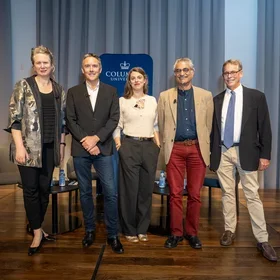U.S. Navy veteran Won Palisoul is an indispensable part of the Columbia University School of Professional Studies community. She is a lecturer in the M.S. in Technology Management program, a course associate in the M.S. in Human Capital Management program, and an alum of the M.S. in Nonprofit Management program.
In addition to her work at Columbia, Palisoul has had profound career success in various roles. She is VP of Dodd-Frank Act (Swap Dealer and Security-Based Swap Dealer) Compliance and an advisor to the Asian Professional Network at SG; founder of Women Veterans and Families Network, Chair of Veterans Roundtable at CFA Society New York; and the Co-Lead of Women Veterans on Wall Street (wVOWS). She also served as Special Assistant to the Under Secretary of Defense for Personnel and Readiness (P&R) at the Pentagon, where she focused on STEM talent management, elite training and education, quality family support, and resilience through diversity, equity, inclusion, and accessibility (DEIA).
In celebration of Veterans Day, we spoke to Palisoul about her time in the Navy, the many hats she’s worn over the years, and her connection to SPS.
What brought you to the Navy?
I come from an immigrant family and being able to pay for college was always in the back of our minds. When I saw their marketing material, I was intrigued by the proposition of getting to see the world and having my education paid for through the G.I. Bill. It was sort of a no-brainer.
Going into my junior year, I decided to take the Armed Services Vocational Aptitude Battery (ASVAB)––the aptitude exam for the military–– to see how well I could do and consider how my career trajectory could match up with my skill set. I did very well in math and science, and after those scores were reported to the military, they contacted me to offer opportunities in the engineering field.
A year before graduating from high school, I joined the late entry program, which trains you physically and mentally and also provides knowledge of naval history. I joined the Navy immediately after graduating.
Tell us a bit about your previous role as a gas turbine engineer in the military.
I worked on gas turbines, which are typically generators or, depending on the class of ship, the propulsion system. These are what you would typically refer to in the civilian world as jet engines. The engines on Boeing airplanes, for example, are gas turbines. You see the same systems and designs used in wind turbines to produce electricity as well, but on a ship, they’re used mainly for propulsion.
Being in the engineering field was quite rewarding. We worked under officers who graduated from world-renowned engineering schools, and my time there gave me the opportunity to get a bachelor’s degree in electronics systems from Southern Illinois University. I then used the G.I. Bill to pay for a master's in information technology (IT). It wasn't until I came to Columbia that I switched from STEM to a humanities-based education.
You’ve had many career pivots. How did that trajectory come about?
Coming out of the military, I started my own small consulting firm to advise on electronics products with a couple of acquaintances. We helped manufacturing companies with wholesale opportunities here in the United States. Then, when my husband and I moved to New York City, I made another career pivot.
I was really fortunate to join the New York Stock Exchange (NYSE) Veteran Associate Program. I got involved with some local communities helping veterans transition out of the military. It was through those veterans’ service organizations (VSOs) that I found out about, applied to, and was brought on as part of the first cohort at the New York Stock Exchange.
At the same time, I applied to Columbia’s M.S. in Nonprofit Management program because I was inspired by the organizations that helped me start my career in finance. A lot of them were struggling. That time, 2011–2012, was the peak of the drawdown from Iraq and Afghanistan. The Department of Defense had been bringing people back from those war zones, and they were paying about $1 billion in unemployment compensation because unemployment among the veteran population was so high. That's largely what prompted the Obama administration to start the Joining Forces program, aligning corporations with the Department of Defense and the veterans’ service organizations to help people transition and find jobs. Given my experience and how these organizations helped me, I really wanted to give back to the community.
You’re an active advocate for women in the military. What inspired you to promote inclusivity in your work?
I saw a gap in their services. When I looked around, I was often the only minority female, or the only female, period, in the room––especially in the engineering field. Women veterans tend not to self-identify, and they weren’t seeking help for a variety of reasons, sometimes because of government statutes.
The Combat Exclusion Act basically said women weren't allowed to serve on the front lines, but in reality, women were serving on the front lines in both Iraq and Afghanistan. Because of the classification restriction, they didn't get the same level of VA benefits and didn't get the same level of treatment for post-traumatic stress disorder. And that was really part of my interest in starting an organization that was more focused on women.
Through the Nonprofit Management program, I started the Women, Veterans, and Families Network, which is still running. We focus on advocating for women veterans and military spouses. We have submitted language to the National Defense Authorization Act and provided recommendations to the Obama and Biden administrations. In 2022, we were awarded by the mayor's office, through the Department of Veterans’ Services, recognition in support of women veterans in the New York City area. All those things came about through the veteran community and the Nonprofit Management program.
Tell us about your experience teaching in the Human Capital Management and Technology Management programs.
The M.S. in Human Capital Management program gave me an opportunity to really build on my passion. I’ve thoroughly enjoyed the program, and I continue to participate and assist where I can. This year, I’m teaching in the Technology Management program. They were looking for someone with a background in finance who had served as an adjunct in the past. That's sort of the magic of SPS. It's really built on relationships and gives alumni opportunities to be involved in different capacities. It’s something that I hold dear and value about SPS. It's quite inclusive and welcoming.
Having served on the Columbia Alumni DC board, I’ve gotten to meet phenomenal people who share their time and expertise. I can't say enough good things about SPS and the community as a whole. A lot of opportunities were afforded to me because of my association with Columbia. In fact, it was through Columbia connections that I was selected for a presidential appointment in the Biden administration as Special Assistant to the Under Secretary of Defense for Personnel and Readiness at the Pentagon. Columbia SPS truly has and continues to shape and advance my whole career.
About the Human Capital Management Program
The Columbia University M.S. in Human Capital Management program prepares graduates to be world-class HCM strategists able to address changing needs in building and motivating talented, engaged workforces in the private, public, academic, and not-for-profit sectors. The program is available part-time, full-time, on-campus, and online.
About the Technology Management Program
Columbia University’s M.S. in Technology Management is a hands-on technology leadership development program designed to train professionals for equal fluency in tech fundamentals, business operations, and ethical leadership.
About the Nonprofit Management Program
Columbia University’s M.S. in Nonprofit Management prepares graduates for leadership roles within mission-driven organizations in a wide variety of contexts, including global and community nonprofits, foundations, education, healthcare, the arts, or as fundraising and development experts.


